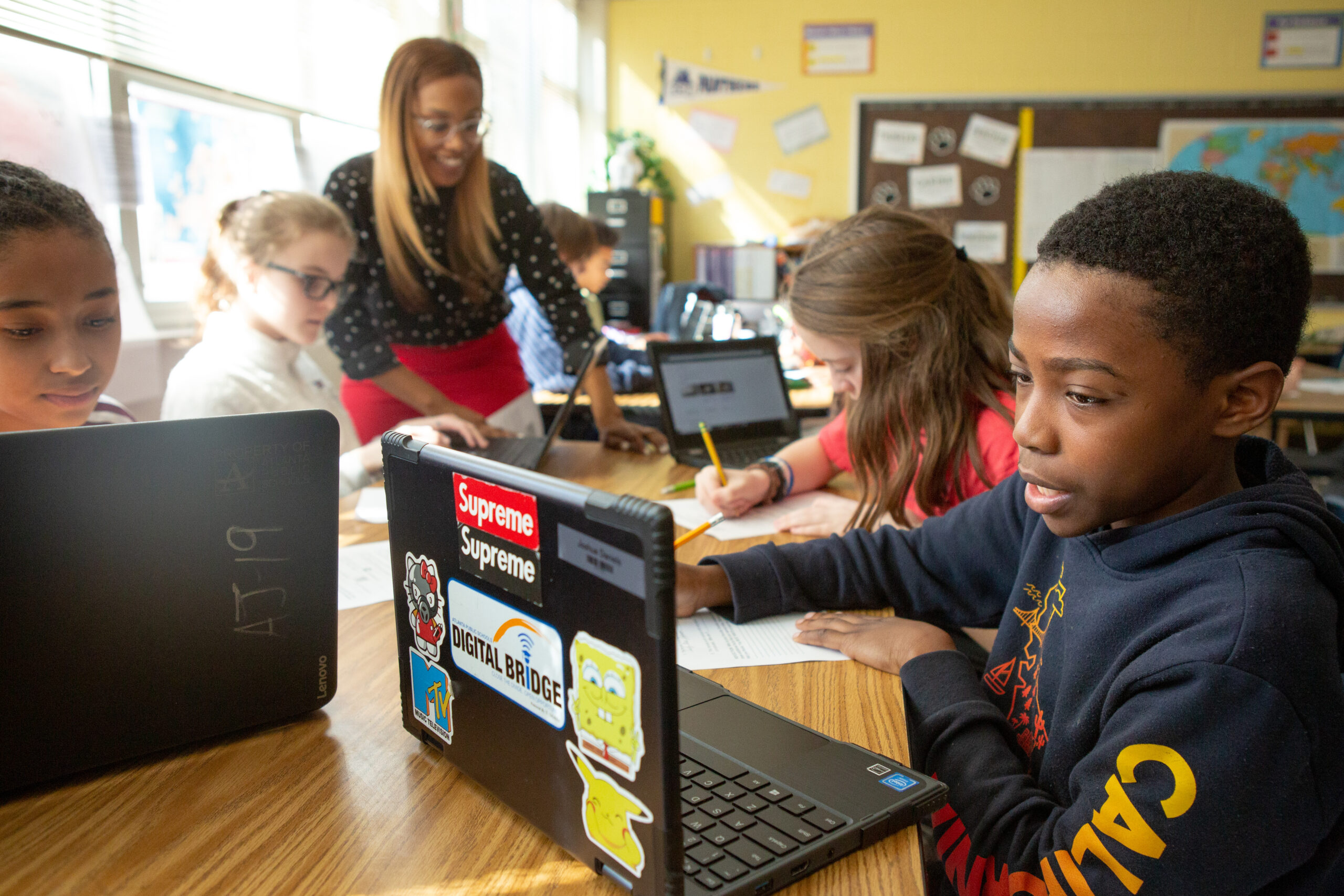Authors: Kimberly Farnsworth & Kelli Paul
Key Ideas
- AI-enhanced game-based activities can support real-time learning and student engagement, but teachers are the key to successful implementation. Teacher-driven integration can be as varied as each individual classroom.
- Our team developed EcoJourneys, an AI-enhanced science game, in which middle school students solve environmental problems.
- Teachers play a vital role in helping students make connections between the classroom and their community and world.
AI-Enhanced Immersive Learning Experiences
Over the past four years, our team has developed EcoJourneys, a narrative-centered, AI-enhanced science game that engages middle school students in solving real-world environmental problems through immersive, story-driven gameplay. Set on a fictional island in the Philippines, students take on the role of scientists investigating a mysterious tilapia die-off, building understanding of ecosystem concepts while practicing collaboration and scientific inquiry. Designed to spark curiosity and scientific reasoning, EcoJourneys connects classroom science to real-world relevance.
EcoJourneys combines immersive learning experiences with an AI system that uses large language models (LLMs) to support real-time gameplay and scaffold student learning and engagement. Given the multiple types of support provided by the embedded AI tools, you may be asking, “Are teachers even needed?”
ABSOLUTELY!!
Supporting the learning of a classroom full of students engaged in collaborative computer-mediated learning activities like EcoJourneys poses multiple challenges to teachers. It was important for our team to design and embed AI tools to ASSIST rather than REPLACE teachers. While we demonstrate how the AI tools can inform them about students’ progress and scientific understanding, we emphasize that it is up to the teachers how to utilize the information to facilitate the curriculum and guide student learning.
Different Teachers, Different Approaches
Over the course of the project, we have implemented EcoJourneys with more than 700 students across 10 schools in Indiana, North Carolina, and New Jersey. As expected, teachers in each classroom uniquely implemented and facilitated the game-based learning activities. We are always intrigued by the variety of ways that teachers modified and personalized the learning environment during gameplay. The spectrum ranged from taking a more hands-off approach, allowing students to play the game almost entirely autonomously, to the teachers taking the lead and fully integrating EcoJourneys into rich, enhanced units. In the latter case, the learning experience is richer and more meaningful because teachers are truly integrating AI into their classrooms.
We recently implemented EcoJourneys in two middle schools in a coastal region, where students live surrounded by aquatic ecosystems. This context provided teachers the opportunity to make the learning experiences especially meaningful to students by making relevant connections to their local community. One teacher opened a lesson by discussing how water quality impacts aquatic life, directly linking the EcoJourneys narrative—tilapia fish sickened due to changes in water quality—to a real-world incident where local fish were dying due to changes in the ecosystem. Students immediately connected the two, recalling the event and its location, making the learning experience more relevant, memorable, and motivating.
Teachers also personalized the learning experience by developing their own classroom activities and scaffolds (e.g., worksheets, slides for class discussions, and class activities) around the game which they shared with each other. Sharing these resources illustrated both collaboration and a strong sense of agency over their science curricula. Rather than treating EcoJourneys as an external tool to simply drop into their classroom, they embedded it into authentic, contextual learning. The materials included handouts about tilapia and water ecosystems for students to complete at the start of class as well as slides that guided whole-class discussions relating to the narrative in the EcoJourneys game.
Implications and Future Research
Currently, the sky seems to be the limit on the possibilities to use AI-tools to support student learning in classrooms. While these tools are quite powerful, they still do not replace teachers. More than simply being “humans in the loop,” teachers are the key to successful AI integration and must remain actively and continuously involved in the learning process, working with and extending beyond the AI tools to engage and make learning relevant and meaningful to their students.
Follow the EngageAI Institute
Visit our website to find out more about EcoJourneys.

